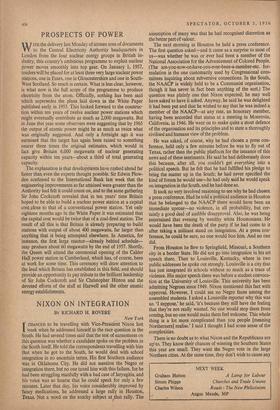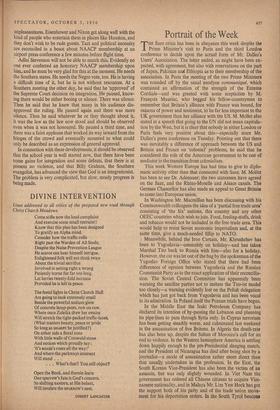NIXON ON INTEGRATION
BY RICHARD H. ROVERE
New York CHANCED to be travelling with Vice-President Nixon last
I
week when he addressed himself to the race question in the South. He had several times said that the test of earnestness on this question was whether a candidate spoke on the problem in the South itself. He told the correspondents travelling with him that when he got to the South, he would deal with school integration in no uncertain terms. His first Southern audience was in Oklahoma City. He did not mention the Negro or integration there, but no one taxed him with this failure, for he had been struggling manfully with a bad case of laryngitis, and his voice was so hoarse that he could speak for only a few minutes. Later that day, his voice considerably improved by fancy medications, he addressed a large rally in Houston, Texas. Not a word on the touchy subject at that rally. The assumption of many was that he had recognised discretion as the better part of valour.
The next morning in Houston he held a press conference. The first question asked—and it came as a surprise to most of us—was whether he was or ever had been a member of the National Association for the Advancement of Colored People. (The are-you-now-orrhave-you-ever-been-a-member-etc. for- mulation is the one customarily used by Congressional com- mittees inquiring about subversive connections. In the South, the NAACP is widely held to be a Communist organisation, though it has never in fact been anything of the sort.) The question was plainly one that Nixon expected; he may well have asked to have it asked. Anyway, he said he was delighted it had been put and that he wished to say that he was indeed a member of the NAACP—at any rate, an honorary member, having been accorded that status at a meeting in Monrovia, California, in 1946. He went on to make quite a stout defence of the organisation and its principles and to state a thoroughly civilised and humane view of the problem.
He was asked, of course, why he had chosen a press con- ference, held only a few minutes before he was to fly out of Texas. rather than the public platform for the issuance of this news and of these sentiments. He said he had deliberately done this because, after all, you couldn't get everything into a political speech. But he felt that he had fulfilled his pledge to bring the matter up in the South: he had never specified the kind of forum he would use—he had only said he would speak on integration in the South, and he had done so.
It took no very involved reasoning to see why he had chosen a press conference. Had he told a political audience in Houston that he belonged to the NAACP there would have been an immediate uproar—no violence, in all probability, but cer- tainly a good deal of audible disapproval. Also, he was being entertained that evening by wealthy white Houstonians. He would have been the death of the party if he had come to it after taking a militant stand on integration. At a press con- ference, he could be sure, no one would boo him. And no one did.
From Houston he flew to Springfield, Missouri, a Southern city in a border State. He did not go into integration in his set speech there. Then to Louisville, Kentucky, where in two public addresses he spoke out strongly. Louisville is a city that has just integrated its schools without so much as a trace of violence. His major speech there was before a student convoca- tion at the University of Louisville. This university has been admitting Negroes since 1949. Nixon mentioned this fact with approval. However, I could see no Negro faces among the assembled students. I asked a Louisville reporter why this was so. 'I suppose,' he said, 'it's because they still have the feeling that they're not really wanted. No one would stop them from coming, but no one would make them feel welcome. This whole thing is a lot more complicated than you people [meaning Northerners] realise.' I said I thought I had some sense of the complexities.
There is no doubt as to what Nixon and the Republicans are up' to. They know their chances of winning the Southern States this year are small. They want the Negro vote in the large Northern cities. At the same time, they don't wish to cause any unpleasantness. Eisenhower and Nixon get along well with the kind of people who entertain them in places like Houston, and they don't wish to be rude guests. Tact and political necessity are reconciled in a boast about NAACP membership at an airport press conference a few minutes before flight time.
Adlai Stevenson will not be able to match this. Evidently no one ever conferred an honorary NAACP membership upon him,. and he must be very glad for this at the moment. He needs the Southern states. He needs the Negro vote, too. He is having a difficult time of it, but he is not without resources. At a Southern meeting the other day, he said that he 'approved' of the Supreme Court decision on integration. He paused, know- ing there would be either booing or silence. There was silence. Then he said that he knew that many in his audience dis- approved the ruling. He paused again and there was more silence. Then he said whatever he or they thought about it, it was the law as the law now stood and should be observed even when it was not honoured. He paused a third time, and there was a faint applause that worked its way inward from the fringes of the crowd and eventually mounted to what could only be described as an expression of general approval.
In connection with these developments, it should be observed that the school year is well started now, that there have been some gains for integration and some defeats, that there is at present no violence, and that Billy Graham, the Southern evangelist, has advanced the view that God is an integrationist. The problem is very complicated, but slow, steady progress is being made.



















































 Previous page
Previous page